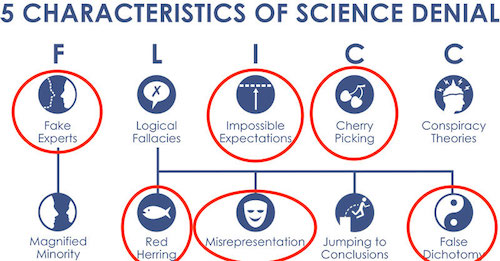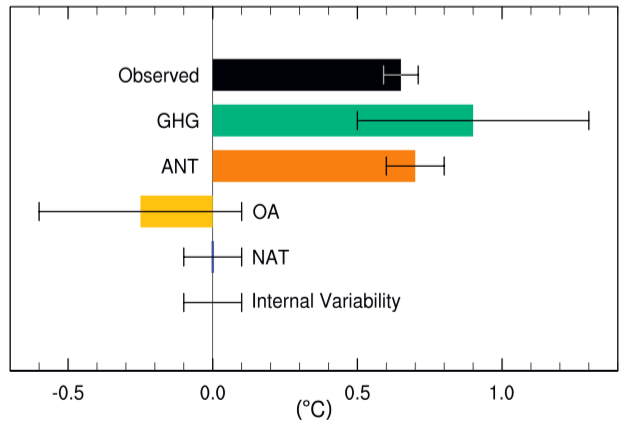
Forbes has trotted out another entirely ignorant piece on climate change, "Is Anything Wrong With Natural, Non-Man-Made Climate Change?" this time by fake expert Mario Loyola, a lawyer with a background in European history. I guess Forbes considers those credentials give him the expertise to communicate the complexities of climate change. Presumably Forbes would hire a physicist as counsel for a lawsuit concerning corporate governance (Loyola's actual area of formal disciplinary expertise).

Loyola first invents a straw man in the form of a mythical ‘environmentalist’. This fantastical creature thinks climate change is bad only because it is caused by humans and would not object to catastrophic climate change if it was natural. Loyola goes on to claim that some people “flatly deny that temperatures and sea levels could be rising partly for natural reasons”. If such people exist, I have never met one. Most of us learn about natural climate change in elementary school when we first read that the climate of the dinosaurs was much different than our current one.
And most of us are able to recognize that multiple drivers combine to give an observed outcome. A car moves from the combined effects of the engine, the slope of the road, and the wind. Climate change is not either human-caused or natural; it is both. We also know that one driver can be much more important than others. The fact that your cat adds heat to your house doesn’t mean your furnace is irrelevant. According to Loyola logic, because natural volcanoes have caused catastrophic devastation in the past we shouldn’t try to prevent humans from releasing a nuclear bomb.
Loyola diligently searched the IPCC AR5 Summary for Policymakers to find a quote to bolster his claims that current climate change could be caused by something other than humans. He chose this one for his misinterpretation: ”It is extremely likely that more than half of the observed increase in global average surface temperature from 1951 to 2010 was caused by the anthropogenic increase in greenhouse gas concentrations and other anthropogenic forcings together." If he had read and understood the report, he would know that his chosen quote about surface air temperatures doesn’t include heating of the oceans, which are absorbing 90% of the excess energy that is warming the planet.
Furthermore, in hunting for an IPCC statement to support his opinion Loyola skipped the statement just above it which is based on all the combined evidence, not just surface temperatures. “It is extremely likely that human influence has been the dominant cause of the observed warming since the mid-20th century.” For sheer brazenness in selective quoting, I nominate Loyola for a cherry-picking trophy.

This figure shows how natural causes (NAT) compare to human drivers (GHG+ANT+OA) of recent climate change.
IPCC AR5 original caption: Figure 10.5. Assessed likely ranges (whiskers) and their mid-points (bars) for attributable warming trends over the 1951–2010 period due to well-mixed greenhouse gases, other anthropogenic forcings (OA), natural forcings (NAT), combined anthropogenic forcings (ANT) and internal variability. The Hadley Centre/Climatic Research Unit gridded surface temperature data set 4 (HadCRUT4) observations are shown in black with the 5 to 95% uncertainty range due to observational uncertainty in this record (Morice et al. 2012).
The notion that scientists don’t understand natural climate change or include it in their assessment of our current crisis is insulting to the thousands of researchers around the world who have spent decades studying the Earth system. These dedicated professionals have laboriously pieced together evidence from ice cores, ocean sediments, archeological and fossil records, and astronomy to build a coherent, consistent, and well-supported history of Earth’s climate.
Loyola is obviously unaware of Earth’s history, as he demonstrates when he laughably explains that because sea level rose by 300 feet at the end of the last ice age we shouldn’t worry about rising seas today. Undoubtably the few million humans on Earth 12,000 years ago were inconvenienced by sea level rise, while they were busy inventing agriculture. Following these absurd ideas, we learn that we shouldn’t worry that carbon dioxide in the atmosphere has soared to levels never experienced in human history (or prehistory) because it was higher 254 million years ago, before dinosaurs even existed!
Amazingly, I found one statement in this sea of ignorance that I agree with: “Policies designed to guard against risks have to take uncertainty into account.” Given that we are uncertain whether human-caused climate change will be very bad, extremely bad, or catastrophic, I agree that it would be prudent to guard against those risks rather than throwing up smokescreens.
Posted by Sarah on Wednesday, 15 February, 2017
 |
The Skeptical Science website by Skeptical Science is licensed under a Creative Commons Attribution 3.0 Unported License. |